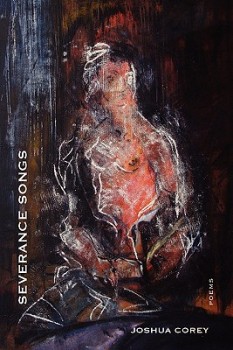Joshua Corey’s first novel, Beautiful Soul: An American Elegy – he’s previously written four books of poetry – builds in a uniquely American way on a primarily European tradition of post-postmodern Holocaust novels. I’ve written about this tradition previously for FWR, discussing Grossman’s See Under: Love, Sebald’s Rings of Saturn, Ozick’s The Shawl and Messiah of Stockholm, Lanzmann’s Shoah, and Gleichmann’s Elixir of Immortality. And Corey’s book, published this spring by Spuyten Duyvil, is a welcome addition to these titles. His book expands on that tradition in interesting ways that help clarify the tradition’s ambitions, as well as the problems of writing about, let alone existing within the shadow of, a generations-ago, foundational, traumatic event.
Like its predecessors, Beautiful Soul appears postmodern in its aesthetics and innovations in that it leverages devices common to the Nouveau Roman and Experimental Novel, such as a subversion of genre fiction tropes through exaggeration, a self reflexivity common to metafiction, and a syntax that intermittently overwhelms through excess. And in keeping with its predecessors, while Beautiful Soul uses these to highlight the reader’s subjectivity and destabilize that subjectivity, its propositional, or overarching, formal moves argue against this central tenet of continental postmodernism: that because the referent of any mimetic work is constructed by the subjectivity of that work’s audience, there can be no real representation, and thus, there can be no ethical obligation to represent, or represent in any particular way. In short: those postmodern novels that do write about the atrocities of WWII, such as a Gras’s Tin Drum, work to highlight the absurdity of trying to find secure ground from which to know, represent, or observe any experience, let alone that of the Holocaust, while disavowing themselves of any particular agency to do anything at all, let alone critique a political position. By contrast, the tradition to which Beautiful Soul belongs at once acknowledges the philosophical problems and ethical issues of representation identified by continental poststructuralism, while refusing the easy, and nihilistic, refusal of agency it advocates.
 Beautiful Soul wants agency, desperately wants to be able to find and relay what it believes is a lost knowledge of a foundational event, namely, the experience of the Holocaust. In fact, the novel can best be understood as a series of quests to do exactly this, each quest itself the subject of yet another quest. The quests frame each other: the novel deploys the New Reader, who deploys Ruth, who deploys the private detective Lamb, and so on. I’ll speak to these plot elements later, but it’s worth mentioning now how similar quests are found in The Messiah of Stockholm, in which a series of characters adopt identities by which to assume roles by which to hunt for Bruno Schulz’s lost novel; or, The Rings of Saturn, in which the unnamed narrator pursues a series of essayistic circumlocutions to match the legs of his walking tour, each of which inquiries terminates at an ad reductio moment that undermines the moment itself; or See Under: Love, whose four sections are sequential experiments seeking the same unattainable knowledge.
Beautiful Soul wants agency, desperately wants to be able to find and relay what it believes is a lost knowledge of a foundational event, namely, the experience of the Holocaust. In fact, the novel can best be understood as a series of quests to do exactly this, each quest itself the subject of yet another quest. The quests frame each other: the novel deploys the New Reader, who deploys Ruth, who deploys the private detective Lamb, and so on. I’ll speak to these plot elements later, but it’s worth mentioning now how similar quests are found in The Messiah of Stockholm, in which a series of characters adopt identities by which to assume roles by which to hunt for Bruno Schulz’s lost novel; or, The Rings of Saturn, in which the unnamed narrator pursues a series of essayistic circumlocutions to match the legs of his walking tour, each of which inquiries terminates at an ad reductio moment that undermines the moment itself; or See Under: Love, whose four sections are sequential experiments seeking the same unattainable knowledge.
I call Corey’s book uniquely American for two reasons. First, one of the modes by which it attempts to discover is a shifting through genre, and an exaggeration of genre conventions. This device in itself is common in the Nouveau Roman and the twentieth-century experimental novel: Hubert Aquin’s Prochain Episode leverages the genre of the spy novel this way; Robert Pinget’s Mahu or the Material regularly announces an intention to switch genres, then does so; Italo Calvino’s If on a Winter’s Night a Traveler shifts genres with each of its embedded versions of If on a Winter’s Night a Traveler, discovered by the framing narrative’s second-person protagonist; Vladimir Nabakov’s Pale Fire does this but with haute literary genres—the epic poem and the scholarly annotation; John Hawkes’ Travesty satirizes the generic modes Nabokov uses in Lolita, which can itself be seen as a propositional satire of genre; and, of course, this kind of play is a staple of the French New Wave and its heirs.
For the Nouveau Roman, this generic play is an experiment based in Bahktin’s notion that the novel is a dialogic form, or one that contains multiple voices and their discourses, juxtaposing the speech of the aristocrat with that of the peddler. The Nouveau Roman sorts these discourses into their own sections, and in this sorting, allows each voice to demonstrably perform its genre. Recognizable commercial genres are obviously functions of style, especially when their conventions are highlighted; by demonstrating that all voices are constructions of style, this compositional mode argues that the novel, along with all other representational modes, can only ever be superficial. The apparent progressive plurality made available by the dialogic form Bahktin describes is then only a disguise for a mix of surfaces signifying nothing more than more surface.
By contrast, Corey invokes generic conventions alternately as topographies or tools for inquiry that, though demonstrative of the crudeness of their utility, also point at the humanity of needing tools, even if genre is all that is available.
He chooses to play with two uniquely American genres. The first is that of the noir, hardboiled detective novel. The second genre is a subset of domestic fiction and the Künstlerroman, or, “the artist’s novel.” It relies on a subliminally Protestant, American trope of non-remunerative work, or the lack of a career, as inherently sinful, and of the financial security that allows for such comforts as a source of malaise. In this instance, it is the topography a young Chicago mother who has exchanged her legal career for the work of a “glorified paralegal” in order to raise her child, an act for which she seems to feel not so much discontented as guilty, as if childrearing where a shameful and inadequate vocation.
In both cases, Corey contrasts his American modes against European ones. His protagonist’s generic topography, a playground, is punctuated by a Russian immigrant who views her husband’s ability to support her as an uncomplicated good. Corey’s hardboiled detective performs his genre in a generically alien topography, that of central Europe. This transnationalism, the overt consciousness of European and American spaces as capable of inter-penetration but not mutual completion, is also to account for the distinctly American feel of the book.
But on to the novel itself, it begins:
Black Screen. A Flicker. The Letter:
In another context, such an opening, like the genre play, might feel like a 1970s meta-fictional setup [i.e., You are about to begin reading Italo Calvino’s new novel, On a Winter’s Night a Traveler. Relax…]. Here, though, that suggestion is consumed by the text. In the following sentence, we’re introduced to the New Reader, our protagonist, a woman who will quickly become Ruth, and who will attempt, through the course of the novel, to become Elsa, the name by which her mother, M., called her. This New Reader lies in the dark beneath her covers, her book bent open on the nightstand beside her. It’s raining, which along with nighttime is requisite for the opening of a noir piece, and she can feel the movement of the shadows of the “little shudders of water” projected from the skylight. These shadows take the form of letters, first hieroglyphics, then Hebrew, which language the New Reader, we later learn, also doesn’t know. Soon, we encounter physical letters, missives from M. that Ruth continues to receive though her mother is deceased.
Already, we have the conceptual setup for Corey’s problem and inquiry: initially, we might take the opening three sentences for a description of a film’s header, played so that the projectionist might focus the image on the screen, or a writer’s blinking cursor. Now, halfway down the page, we realize they could equally well summarize the opening scene. Of equal importance, the protagonist can feel the movement of shadows without seeing them, and the shadows are themselves the residue of a shudder. It’s a complex metaphor for the book’s approach to mimesis: falling water denied its trajectory becomes a palpable shadow, that shadow takes the form of languages the reader cannot read, and not just any languages, but those of the Jews and the Egyptians. The metaphor’s allusions are obvious and seemingly unending, ranging from Genesis to Exodus to the Holocaust. And, the metaphor is itself not only a metaphor for the opening lines, but a replacement of them.
Of course, this rearward inscription by what comes next is the basic work of poetry, or of propositional metaphor as the dominant mode of poetry. However, poetry typically presents a tenor as complete until the vehicle’s arrival at once reveals the tenor’s incompletion and completes it. Corey’s metaphoric action here highlights the ways in which the metaphor is an imbedded model of mimesis, one in which the mimetic act replaces its subject (tenor, referent, subject, Platonic Ideal), while demonstrating how it, as a replacement, is also inadequate. And as Corey’s signifier, in this case the word “letters,” shifts signifieds (definitions), it takes with it a trace of the prior signified even as it precludes it.
This trying on of signifieds for a constant signifier is inverted in the case of the protagonist’s name. In this case, the protagonist remains (mostly) constant even as her signifier shifts, and even as she wishes to shift: once she is Ruth, she is no longer the New Reader. She wishes to become Elsa, in order to no longer be Ruth, even if Elsa also constitutes Ruth and the New Reader. In any event, the protagonist is incomplete, whether by virtue of not knowing her father, her domestic dissatisfaction, her not knowing of her mother, or even by her mother’s inability to learn, and know, her own father’s experience in the camps.
 Incompleteness, though, drives the quest for completion, and in turn dramatic action: because of the letters, “sleepwalking she [Ruth] might arise,” and drive to the office of a private detective, Lamb, that he might seek out not the letters’ origin, but the identity of Ruth’s “real” father, a task accomplishable, she believes, by virtue of the letters. The self-reflexive conjecture expressed in that “might” becomes one of the novel’s primary trajectories. Lamb travels to Europe to attempt to discover Ruth’s real father, a task that consumes Ruth’s inheritance and yields much of the book’s latter half. Lamb, naturally, continues to perform noir wherever he goes, engaging in shady exchanges and train bathroom dalliances. But, while Lamb penetrates deep into Europe and into the past, his American genre yields narratives that, while interesting to Americans, are not the origin myths, the knowledge of the Holocaust for which Ruth longs. Instead, we are ultimately delivered a monologue by a man who may, or may not, have impregnated M., Gustave, and in his monologue, the shadow of M.’s own quest to Poland to see for herself the place of the Holocaust.
Incompleteness, though, drives the quest for completion, and in turn dramatic action: because of the letters, “sleepwalking she [Ruth] might arise,” and drive to the office of a private detective, Lamb, that he might seek out not the letters’ origin, but the identity of Ruth’s “real” father, a task accomplishable, she believes, by virtue of the letters. The self-reflexive conjecture expressed in that “might” becomes one of the novel’s primary trajectories. Lamb travels to Europe to attempt to discover Ruth’s real father, a task that consumes Ruth’s inheritance and yields much of the book’s latter half. Lamb, naturally, continues to perform noir wherever he goes, engaging in shady exchanges and train bathroom dalliances. But, while Lamb penetrates deep into Europe and into the past, his American genre yields narratives that, while interesting to Americans, are not the origin myths, the knowledge of the Holocaust for which Ruth longs. Instead, we are ultimately delivered a monologue by a man who may, or may not, have impregnated M., Gustave, and in his monologue, the shadow of M.’s own quest to Poland to see for herself the place of the Holocaust.
Gustave’s monologue, in many ways, delivers what we as readers want, generically, from a narrative. His is an exotic bildungsroman, culminating in an impossible romance, a love triangle (or rectangle, even), set against the events of May, 1968 in Paris. In the end, though, this tale too offers Ruth no answers, no access. It’s another allegory of a representational act whose signification is rived from that which it signifies. Sure, Gustave is an artist whose most important painting is taken from him and who afterwards, as a housepainter, paints blank walls; that’s the easy metaphor. More important is his relationship to the events of May, 1968, which he relates in terms of the movement’s attempt, and, specifically, the attempts of his fellow students, upper-class intellectuals, to reunite the workers with the material conditions of their existence from which they have become alienated by virtue of the hegemonic culture’s construction of their consciousness. This, of course, is simple enough allegory for the division of the post-Holocaust subject from her own history by the erasure of her people.
In Beautiful Soul, this attempt to become un-alienated is mandatory and impossible. And, as with the quest of Gustave’s peers, the quest is doomed (though its failure is also generative: of Ruth, of narrative). The material conditions lie on the other side of a skylight, and yet their shadows, shudders in the form of the letters with which their God, according to Jewish theology, created the world, are palpable, moving.
Beautiful Soul is a kind of metafictional experiment, but only to the extent that it points out that it is an essay, or a poem, maybe, attempting to access a necessary aspect of its creation that can only be accessed through imagination, fiction, and not even then. The resort to a metafictional mode confesses the text’s despair: it doesn’t believe in a transparent language that might directly relate its action, but then the notion that the text’s materiality might succeed where its signification could not seems more Quixotic than optimistic.
Beautiful Soul is in essence a quest, one that would have made sense to the Romantics, who strove to invoke a transcendental subject through mimesis by at once representing the past and also surpassing it. Of the relationship between them and the Greeks, Piotr Parlej writes in the introduction of The Romantic Theory of the Novel:
The relation between the ancients and the moderns is a function of this double call, a call at once to imitate and surpass, a call whose logic exhibits at its very core a certain excess powerful enough to set in motion a mechanism of essential incompletion of completion.
But the past of Beautiful Soul isn’t just incomplete, it’s unknowable, hidden in the erasure of people on a remade foreign continent, where even the most hard-boiled of private eyes either cannot discover or discovers avidly in the wrong direction, such that Ruth must ultimately call him off his search. And yet:
The book is mine while I read it, for as long as I keep turning the pages.
And, in an echo from the book’s far end:
I want to be alone for a while. Because once I’m dead, I won’t be alone any more. I won’t belong to me.
The dead may no longer belong to themselves, books may no longer belong to us once they’re in the hands of another, but then they may also no longer belong to anyone else. Beautiful Soul: An American Elegy eloquently expresses the attempt to at least own the quest, while the pages are still turning, to express the double loss of the Holocaust: that which is caused by the dead’s lost ownership of themselves, and that which is lost with the dead by virtue of their aloneness, or separation, from those who are left.






